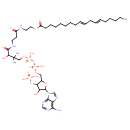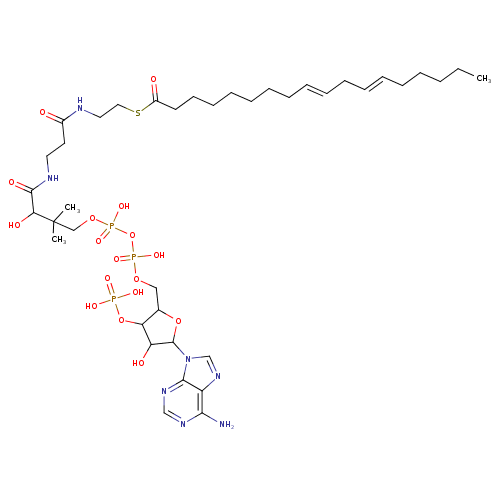|
Record Information |
|---|
| Version |
1.0 |
|---|
| Update Date |
1/22/2018 11:54:54 AM |
|---|
|
Metabolite ID | PAMDB120086 |
|---|
|
Identification |
|---|
| Name: |
linoleoyl-CoA |
|---|
| Description: | Tetraanion of linoleoyl-CoA arising from deprotonation of phosphate and diphosphate functions. |
|---|
|
Structure |
|
|---|
| Synonyms: | - cis,cis-octadeca-9,12-dienoyl-CoA
- (9Z,12Z)-octadeca-9,12-dienoyl-CoA
- 18:2(n-6)
|
|---|
|
Chemical Formula: |
C39H62N7O17P3S |
|---|
| Average Molecular Weight: |
1025.937 |
|---|
| Monoisotopic Molecular
Weight: |
1029.3448 |
|---|
| InChI Key: |
YECLLIMZHNYFCK-RRNJGNTNSA-J |
|---|
| InChI: | InChI=1S/C39H66N7O17P3S/c1-4-5-6-7-8-9-10-11-12-13-14-15-16-17-18-19-30(48)67-23-22-41-29(47)20-21-42-37(51)34(50)39(2,3)25-60-66(57,58)63-65(55,56)59-24-28-33(62-64(52,53)54)32(49)38(61-28)46-27-45-31-35(40)43-26-44-36(31)46/h8-9,11-12,26-28,32-34,38,49-50H,4-7,10,13-25H2,1-3H3,(H,41,47)(H,42,51)(H,55,56)(H,57,58)(H2,40,43,44)(H2,52,53,54)/p-4/b9-8-,12-11-/t28-,32-,33-,34+,38-/m1/s1 |
|---|
| CAS
number: |
6709-57-5 |
|---|
| IUPAC Name: | 3'- phosphonatoadenosine 5'- phosphonatoadenosine 5'- {3- {3- [(3R)- [(3R)- 3- 3- hydroxy- hydroxy- 2,2- 2,2- dimethyl- dimethyl- 4- 4- ({3- ({3- [(2- [(2- {[(9Z,12Z)- {[(9Z,12Z)- octadeca- octadeca- 9,12- 9,12- dienoyl]sulfanyl}ethyl)amino]- dienoyl]sulfanyl}ethyl)amino]- 3- 3- oxopropyl}amino)- oxopropyl}amino)- 4- 4- oxobutyl] diphosphate} oxobutyl] diphosphate} |
|---|
|
Traditional IUPAC Name: |
[5-(6-aminopurin-9-yl)-4-hydroxy-2-[({hydroxy[hydroxy(3-hydroxy-2,2-dimethyl-3-{[2-({2-[(9E,12E)-octadeca-9,12-dienoylsulfanyl]ethyl}carbamoyl)ethyl]carbamoyl}propoxy)phosphoryl]oxyphosphoryl}oxy)methyl]oxolan-3-yl]oxyphosphonic acid |
|---|
| SMILES: | CCCCCC=CCC=CCCCCCCCC(SCCNC(=O)CCNC(=O)C(O)C(C)(C)COP(=O)(OP(=O)(OCC1(C(OP([O-])(=O)[O-])C(O)C(O1)N3(C2(=C(C(N)=NC=N2)N=C3))))[O-])[O-])=O |
|---|
|
Chemical Taxonomy |
|---|
|
Taxonomy Description | This compound belongs to the class of chemical entities known as long-chain fatty acyl coas. These are acyl CoAs where the group acylated to the coenzyme A moiety is a long aliphatic chain of 13 to 21 carbon atoms. |
|---|
|
Kingdom |
Chemical entities |
|---|
| Super Class | Organic compounds |
|---|
|
Class |
Lipids and lipid-like molecules |
|---|
| Sub Class | Fatty Acyls |
|---|
|
Direct Parent |
Long-chain fatty acyl CoAs |
|---|
| Alternative Parents |
|
|---|
| Substituents |
- Coenzyme a or derivatives
- Purine ribonucleoside 3',5'-bisphosphate
- Purine ribonucleoside bisphosphate
- Purine ribonucleoside diphosphate
- Pentose phosphate
- Pentose-5-phosphate
- Ribonucleoside 3'-phosphate
- Beta amino acid or derivatives
- Glycosyl compound
- N-glycosyl compound
- Monosaccharide phosphate
- Organic pyrophosphate
- 6-aminopurine
- Pentose monosaccharide
- Imidazopyrimidine
- Purine
- Monoalkyl phosphate
- Aminopyrimidine
- Fatty amide
- Imidolactam
- Monosaccharide
- N-acyl-amine
- N-substituted imidazole
- Organic phosphoric acid derivative
- Alkyl phosphate
- Phosphoric acid ester
- Primary aromatic amine
- Pyrimidine
- Oxolane
- Azole
- Imidazole
- Heteroaromatic compound
- Amino acid or derivatives
- Thiocarboxylic acid ester
- Carboxamide group
- Carbothioic s-ester
- Secondary carboxylic acid amide
- Secondary alcohol
- Sulfenyl compound
- Thiocarboxylic acid or derivatives
- Organoheterocyclic compound
- Azacycle
- Oxacycle
- Carboxylic acid derivative
- Hydrocarbon derivative
- Alcohol
- Organic nitrogen compound
- Amine
- Organonitrogen compound
- Carbonyl group
- Organooxygen compound
- Organosulfur compound
- Organic oxygen compound
- Organopnictogen compound
- Primary amine
- Organic oxide
- Aromatic heteropolycyclic compound
|
|---|
| Molecular Framework |
Aromatic heteropolycyclic compounds |
|---|
| External Descriptors |
Not Available |
|---|
|
Physical Properties |
|---|
| State: |
Solid |
|---|
| Charge: | -4 |
|---|
|
Melting point: |
Not Available |
|---|
| Experimental Properties: |
| Property | Value | Reference |
|---|
| Melting Point | Not Available | Not Available | | Boiling Point | Not Available | Not Available | | Water Solubility | Not Available | Not Available | | LogP | Not Available | Not Available |
|
|---|
| Predicted Properties |
|
|---|
|
Biological Properties |
|---|
| Cellular Locations: |
Not Available |
|---|
| Reactions: | |
|---|
|
Pathways: |
Not Available |
|---|
|
Spectra |
|---|
| Spectra: |
Not Available |
|---|
|
References |
|---|
| References: |
- Ramsay RR, Mancinelli G, Arduini A: Carnitine palmitoyltransferase in human erythrocyte membrane. Properties and malonyl-CoA sensitivity. Biochem J. 1991 May 1;275 ( Pt 3):685-8. [2039446 ]
- Domergue F, Abbadi A, Ott C, Zank TK, Zahringer U, Heinz E: Acyl carriers used as substrates by the desaturases and elongases involved in very long-chain polyunsaturated fatty acids biosynthesis reconstituted in yeast. J Biol Chem. 2003 Sep 12;278(37):35115-26. Epub 2003 Jun 30. [12835316 ]
- Kawasaki T, Snyder F: Synthesis of a novel acetylated neutral lipid related to platelet-activating factor by acyl-CoA:1-O-alkyl-2-acetyl-sn-glycerol acyltransferase in HL-60 cells. J Biol Chem. 1988 Feb 25;263(6):2593-6. [3422635 ]
- Ensenauer R, He M, Willard JM, Goetzman ES, Corydon TJ, Vandahl BB, Mohsen AW, Isaya G, Vockley J: Human acyl-CoA dehydrogenase-9 plays a novel role in the mitochondrial beta-oxidation of unsaturated fatty acids. J Biol Chem. 2005 Sep 16;280(37):32309-16. Epub 2005 Jul 14. [16020546 ]
- Ciapaite J, Bakker SJ, Van Eikenhorst G, Wagner MJ, Teerlink T, Schalkwijk CG, Fodor M, Ouwens DM, Diamant M, Heine RJ, Westerhoff HV, Krab K: Functioning of oxidative phosphorylation in liver mitochondria of high-fat diet fed rats. Biochim Biophys Acta. 2007 Mar;1772(3):307-16. Epub 2006 Nov 10. [17184976 ]
- Silva C, Loyola G, Valenzuela R, Garc?a-Huidobro T, Monasterio O, Bronfman M. High-affinity binding of fatty acyl-CoAs and peroxisome proliferator-CoA esters to glutathione S-transferases effect on enzymatic activity. Eur J Biochem. 1999 Nov;266(1):143-50.
|
|---|
| Synthesis Reference: |
Kawaguchi, Akihiko; Yoshimura, Tsutomu; Okuda, Shigenobu. A new method for the preparation of acyl-CoA thioesters. Journal of Biochemistry (Tokyo, Japan) (1981), 89(2), 337-9. |
|---|
| Material Safety Data Sheet (MSDS) |
Not Available |
|---|
|
Links |
|---|
| External Links: |
|
|---|


